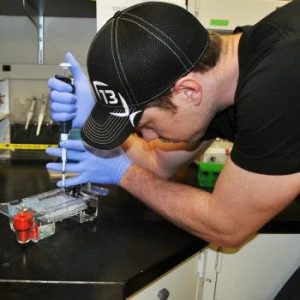Meet Joel Madson, Alum, Bridges to Baccalaureate Program A.A.
Joel: “I did biomedical research and was mentored by professionals through the Bridges to the Baccalaureate Degree Program. I absolutely recommend it to anyone who is interested in pursuing graduate school.” 
“I’m a curious person,” said Joel Madson. “I just like to learn. It is pretty cool to discover things through lab research that are not yet known.”
Madson was a trainee in the “Bridges to the Baccalaureate Degree Program”, a two-year science research training program. Funded by a grant from the National Institute of Health/National Institute of General Medical Sciences, the “Bridges to the Baccalaureate Degree Program” is coordinated in partnership with the University of Minnesota Medical School, Duluth Campus, Lake Superior College and other two-year colleges. The undergraduate students work on biomedical research projects and are mentored by UMD faculty.
Madson earned his Associate of Arts degree while participating in the Bridges to the Baccalaureate Degree Program.” He transfered to the University of Minnesota Duluth for biology. After completing his four-year degree, he plans to attend medical school to become a physician.
The Bridges Program provides professional development activities and an appointment as a paid research assistant. Trainees participate for 10 weeks of full-time employment during the summer, and part-time employment at 15 hours per week during the academic year. The role of the program is to develop a pipeline for Lake Superior College students to pursue careers in STEM fields.
Since the program’s inception in 1995, there have been more than 90 LSC students who have participated in training with many of these students progressing on to graduate school or medical school.
Madson represented LSC at the Annual Biomedical Research Conference for Minority Students (ABRCMS) in Phoenix, AZ. At the national conference, Madson presented his biomedical research on the physiological control that hormones have within the cochlea to better understand the pathway of potassium recycling in the inner ear.
Madson considers the best part of the Bridges program is its broad scope. “You can take it as far as you want. The more effort you are willing to put into it, the more you will get out of it. You can travel, network, discover and present research, write for scientific journals, and build life long bonds with people along the way. You are not limited to only biomedical research. You can do research in any STEM field.”
